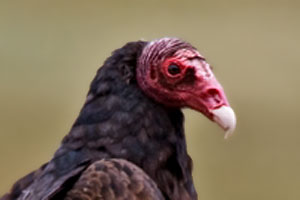Behavior: Turkey vultures are almost exclusively scavengers (Cathartes means "purifier"), so this species rarely kills small animals. They form communal roosts which facilitate group foraging and social interactions. The roosts range in size from a few birds to several thousand.
Turkey Vultures are often seen standing in a spread-winged stance — called the "horaltic pose." The horaltic pose is believed to serve multiple functions: drying the wings, warming the body, and baking off bacteria.

Groups of vultures spiraling upward to gain altitude are called "kettles". As vultures catch thermal updrafts they take on the appearance of water boiling in a pot – hence the name kettle.
Why do turkey vultures defecate on their feet?During the hot weather, turkey vultures will defecate on their feet to cool them off. Since a vulture's digestive juices kill bacteria — which is why vultures don't get sick from eating rotten meat — defecating on their legs might even work as an antiseptic wash.
Why do turkey vultures vomit?Their method of self-defense is to vomit their food, which they can send sailing 10 feet. If a turkey vulture is disturbed or harassed, it will throw up on the animal that is bothering it. Even the vulture babies will vomit on other animals. Though these behaviors might distress people, they serve turkey vultures well. Vulture vomit is an effective predator repellent.
Did you know?:
- The Turkey Vulture does not build a nest — they lay eggs directly on the ground.
- The Turkey Vulture’s highly developed olfactory sense enable individuals to locate concealed carcasses
- They can fly low to the ground to pick up the scent of dead animals.
- A Turkey Vulture live up to 20 years in the wild.
- People mistakenly call turkey vultures, buzzards, which is the British name for certain hawks.
Pages: 1 · 2






